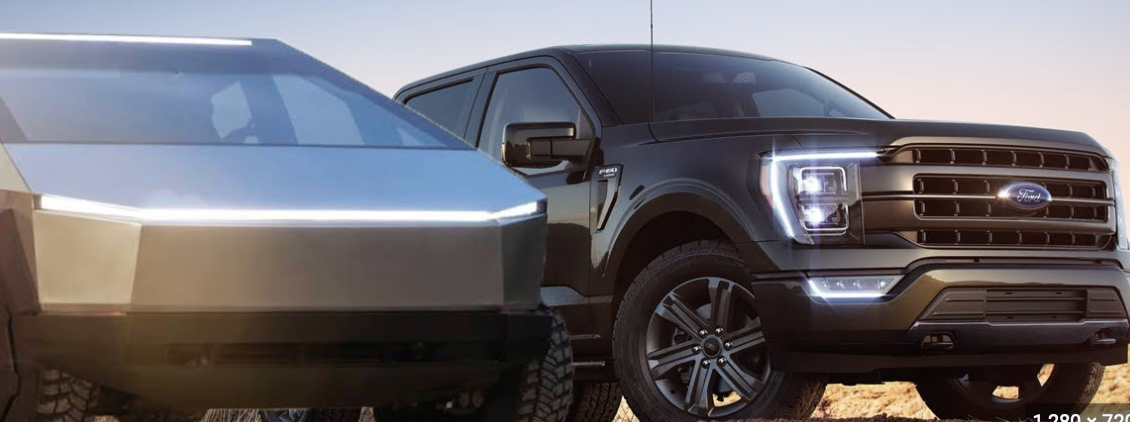The automotive landscape is undergoing a seismic shift, with electric vehicles (EVs) emerging as the pioneers of sustainable transportation. In this electrifying duel, we pit two titans against each other: the 2024 Tesla Cyber Truck and the 2024 Ford F-150 Lightning. These electric pickups are not just vehicles; they represent the future of the trucking industry, promising to revolutionize the way we view power, performance, and environmental responsibility.
- Price and Accessibility:The battle begins with the price tag, and here Ford's F-150 Lightning Pro takes the lead. With a starting price of $49,999, it offers a more accessible entry point compared to the Tesla Cyber Truck's dual motor model at $79,999. Ford's diverse trim options cater to various budgets, making it a winner in this round for those looking for a cost-effective electric truck.
- Cargo Space:When it comes to hauling capacity, the Cyber Truck steals the spotlight. Its 6.5 x 4 ft cargo bed boasting a jaw-dropping 2,500 lb capacity outshines the F-150 Lightning's 5.5 ft bed with 52.8 cubic feet of cargo volume. While the Lightning offers practical features like bed steps and cargo tie downs, the Cyber Truck emerges victorious in sheer cargo-carrying capability.
- Interior Features:Ford's F-150 Lightning Pro impresses with a fully digital instrument panel, a 12-inch touchscreen, and a suite of tech features including Apple CarPlay and Android Auto. In contrast, Tesla's Cyber Truck remains a bit of an enigma, with details yet to be fully disclosed. If Tesla follows its previous trends, we can expect a minimalist yet tech-savvy interior anchored by a sizable touchscreen.
- Acceleration:Speed enthusiasts will find joy in both offerings. The F-150 Lightning Pro accelerates from 0 to 60 mph in under 4 seconds with its extended range battery, showcasing its prowess. However, the Cyber Truck, with its dual motor variant hitting 0 to 60 mph in 4.1 seconds and the tri motor variant achieving a jaw-dropping 2.6 seconds, raises the bar for electric truck acceleration.
- Range and Charging:Range anxiety is quelled by both contenders, but Tesla's extensive charging network gives the Cyber Truck an edge. With a range of 320 miles for the dual motor and 340 miles for the tri motor, coupled with the efficiency of Tesla's Supercharger stations, it secures a win in the range and charging category.
- Towing Capacity:These electric beasts flex their muscles in towing capacity. The F-150 Lightning with the max trailer tow package can pull up to 10,000 lb, an impressive feat. Yet, the Cyber Truck matches and surpasses it, boasting a towing capacity of up to 11,000 lb for both dual and tri motor configurations.
- Safety Features:Safety is paramount, and both trucks are equipped with advanced safety features. The F-150 Lightning comes standard with a suite of safety technologies, including automatic emergency braking and lane departure warning. While Tesla has not specified the Cyber Truck's safety features, the reputation of its advanced safety systems, including autopilot, instills confidence.
- Conclusion:In this head-to-head clash, both the Tesla Cyber Truck and the Ford F-150 Lightning showcase the electric future of pickup trucks. Ford's Lightning caters to a broader audience with its attractive price points and practical features, while Tesla's Cyber Truck aims to redefine the trucking experience with unparalleled performance and cutting-edge technology.
Ultimately, the choice between these two electric powerhouses hinges on individual priorities—whether it's a balance of affordability and functionality with the F-150 Lightning or a pursuit of performance and innovation with the Cyber Truck. The future of electric trucks has never looked more promising, and consumers now have the privilege of choosing between two exceptional contenders. As the automotive landscape transforms, these electric trucks pave the way for a cleaner, greener, and more thrilling driving future.
